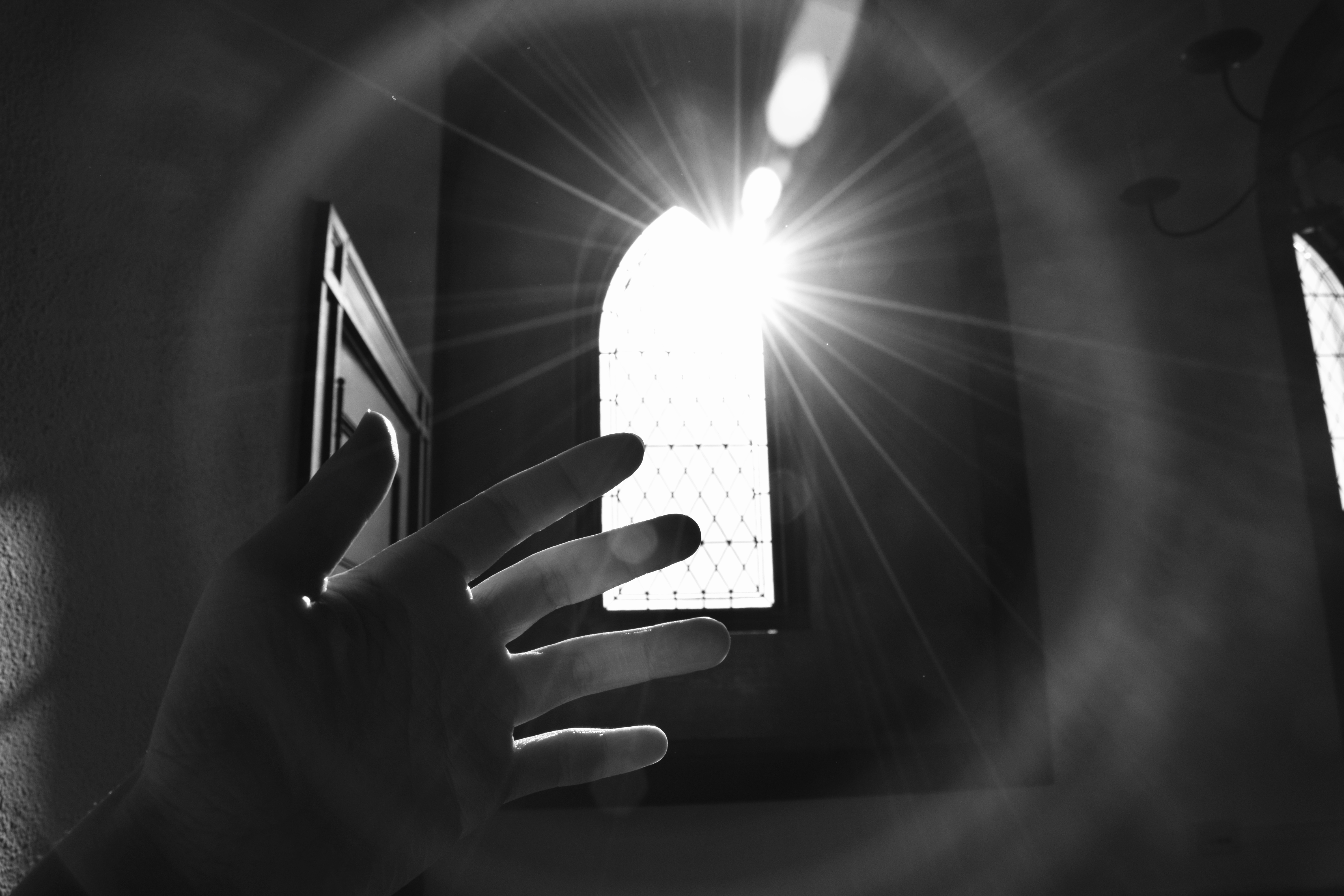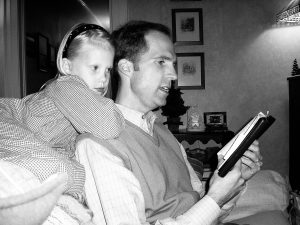“Therefore, there is now no condemnation for those who are in Christ Jesus.” Romans 8:1 (NIV)

We are all looking for a verdict.
We want to be told that we are good enough and that we matter. In other words, we want a verdict that our life is meaningful. We seek that verdict from many places, whether from our work, our relationships, our reputation. We make these things our judges, we ask them if we are good enough, and we let them determine our worth. We place the “condemnation gavel” into the hands of something, but the verdict the world gives us is always, eventually, “Not good enough.” And so, we live in fear, knowing that a verdict of condemnation is coming.
Looking inside for a verdict doesn’t seem to work any better. Too often we take the messages from our screens and the world around us and put the condemnation gavel in our own hands, whether or not we have received an explicit verdict from outside us. A recent issue of New York magazine described people today as “feeling guilty and inadequate at every turn.1 They compare themselves relentlessly to others. They are turned inside out, day after day, by social media.” One person says, “I think my primary emotion is guilt. When I am happy, it only takes moments before I feel guilty about it – I feel desperately unworthy of my happiness, guilty for receiving it out of the pure chaotic luck of the universe.” The author summarizes life today like this: “Merely muddling through, doing your best, seeing friends when you can, trying to enjoy yourself as much as possible, is, according to the reigning dictates of today’s culture, tantamount to failure. You must live your best life and be the best version of yourself, otherwise you’re nothing and no one.” We feel naked and ashamed, and the constant din of our notifications amplifies our insecurities. We are filled with anxiety and doubt and guilt, and we are working harder and harder to convince everybody, including ourselves, that we have it together. This is what condemnation looks like. We don’t need condemnation to come from the outside when we already condemned ourselves.
The Bible says that anything we look to besides God for our verdict is an idol, and idols always let us down, always condemn, and always demand everything from us. We place the condemnation gavel in the hands of our reputation, our career, our looks, our health, our relationships, what our friends think of us, what we think of us – and these idols never fail to hammer in condemnation. The verdict seems to come from within when we internalize what our external idols already tell us. We crave a favorable verdict, but nothing we look to in this world can truly give it.
This is why the apostle Paul says in his letter to the Romans that in Christ alone the verdict is “no condemnation.” To summarize what Paul already said, the gospel is this: All have sinned, but God freely justifies through the atoning work of Jesus. Sin means we don’t love God with all our heart and soul and mind and strength, but instead we love created things – our reputation, comfort, job, health, romance, or family, even our own opinion of ourselves – more than the Creator. We don’t find our satisfaction in God, but instead we look to idols for our satisfaction. We don’t obey God, but instead we obey our own desires and emotions. We don’t love our neighbor as ourselves, but instead we seek our own good, or we serve others inasmuch as it is convenient for us, or in our interest, or makes us look or feel good. Every single one of us, religious or not, falls short of God’s glory.
But as a gift, God freely justifies, which means “to declare in the right.” Even though we fall short of God’s glory, even though we are sinners, in Christ God counts us as if we aren’t. Think of it this way. Suppose that a student of mine fails an exam and I want to have mercy. I can’t honestly say, “You did great on the exam!” because they didn’t, but I can say, “I won’t count this exam toward your final grade.” Similarly, in Christ, God doesn’t count our sin against us, but instead He counts Jesus’ faithfulness for us. In doing so, God declares that His promises to rescue and redeem His people, to love and bless His people, and to make them a blessing to the world, all apply to us. This is God’s gift to us; we don’t earn it. We were sinners deserving condemnation, but God forgives us and counts us as holy.

Paul says that for the Christian there is therefore no condemnation. Paul doesn’t say, “You are not condemned … for now, but if you screw up again you’ll need more forgiveness.” Paul says there is no condemnation. None ever. Jesus bore all of your sin – all of it, past, present, and future – so there is no condemnation and there will be no condemnation. Paul writes, “God has done what the law … could not do. By sending his own Son … he condemned sin in the flesh.” God definitively condemned sin so He will never condemn you. That’s why at the end of Romans 8 Paul can say, “Nothing can separate you from the love of Christ”; that’s why a good summary of the gospel is, “You are more wicked than you could ever imagine, but in Christ you are more loved than you could ever dare hope.”2 Why would God do that?
God gives the declaration “no condemnation” so that we can live beautiful, holy lives. Only in the gospel of Jesus Christ does the declaration of “accepted” come before any acceptable performance; only in the Gospel does the verdict come before it is earned. You won’t find this order anywhere else. In school, if you do well enough on an exam, you get the grade. In traditional religion, if you are moral or observant enough, you get salvation or acceptance. Today, many people reject traditional religion and instead get their identity from being a good person. If you are a good enough person, eventually you get the verdict. If you work enough for justice, you get the verdict. If you express yourself or liberate yourself or accept yourself or find yourself – you get the verdict. As a result, every day is a trial with us in the court working for a verdict.
But in Jesus, Christians get the verdict “no condemnation,” and then the verdict leads to a changed performance. When Jesus rescued the woman caught in adultery, Jesus turned to her and said, “Has no one condemned you?” and she said, “No one, Lord.” And Jesus said, “Neither do I condemn you; go, and from now on sin no more.” Jesus did not condemn her, and only then did he tell her to sin no more.3 Reversing the order loses the gospel. Traditional religion says, “Stop sinning and I won’t condemn you,” and that’s crushing. Modern society says, “There is no sin so there is nothing to condemn,” yet our hearts still condemn us because we know that isn’t right. But Jesus says, “Because I don’t condemn you, stop sinning.” When you have already been forgiven and set free, then love and gratitude become the motivation for obedience. If we must perform in order to avoid condemnation, then we obey out of fear of punishment, or to avoid feelings of guilt, or out of pride – because in pride we believe, “We are not the kind of people who get condemned.” But those who by grace have received “no condemnation” are set free to live beautiful, holy lives out of sheer, grateful love for what Christ has done.
Nonetheless, our lives are never paragons of beauty and holiness. I lose my temper with my kids, my parents, my spouse. We all struggle in some way. We gossip, we judge others who don’t have it together, we are insensitive, we dismiss people we disagree with. We lust, we covet, we envy. Anxiety, doubt, and temptation rule us. Our lives are not beautiful. Our failures produce panic as we fear what that means – might we not be forgiven? Deep insecurity and doubt arise – might we be condemned?
Paul’s original readers had those same doubts and Paul knew it. Fear creeps in when we forget that in Jesus we are not condemned. That’s why Paul chronicles his own failings and struggles in Romans 7 and then declares, “There is no condemnation.” Paul reminds us that the only one who could ultimately condemn you is Jesus, and he died for you, and he lives for you, and he will not condemn you. The God who created the world – the God of infinite holiness and power, the God whose voice shakes the heavens and causes the earth to quake – looks upon you and graciously welcomes you into his arms. If you have put your faith in Jesus but still feel condemned, then you are still placing the condemnation gavel somewhere, perhaps in your own goodness, your reputation, or how much you are doing for God.
When we work for our verdict, we think we can be loved only if we aren’t deeply known because being known makes us feel naked and ashamed. But for those who desperately want to be honest and loved, God knows the depths of your heart – all your brokenness and failings – and He loves you more than you could ever hope. For those who constantly feel naked and ashamed, Jesus was shamefully stripped naked on the cross for you to buy your freedom. Jesus took on our guilt and shame and received the condemnation we deserve, so that we can receive the life and righteousness that is his. If you wait for the world’s verdict, you will be in constant fear of condemnation, because the condemnation is guaranteed. But if you receive God’s verdict as your own, there is no more fear.
Our lives do not magically become beautiful when we start to follow Jesus. Life in this broken world is a painful struggle. We continue to do things we are rightly ashamed of. We continue to hurt others and have others hurt us. The world’s condemnation still screams past all our filters. This fractured world is full of guilt and shame and loneliness and anxiety, and we feel that. For Christians, those difficulties do not end, but the condemnation does.

1 https://www.thecut.com/2016/07/ask-polly-advice-lessons.html
2 Tim Keller has said that in many places. Indeed, this entire article is heavily influenced by his teaching on this passage.
3 See John 8:1-11 for the full story
Originally published in The Williams Telos Issue 14, FEAR
Written by Prof. Greg Phelan





